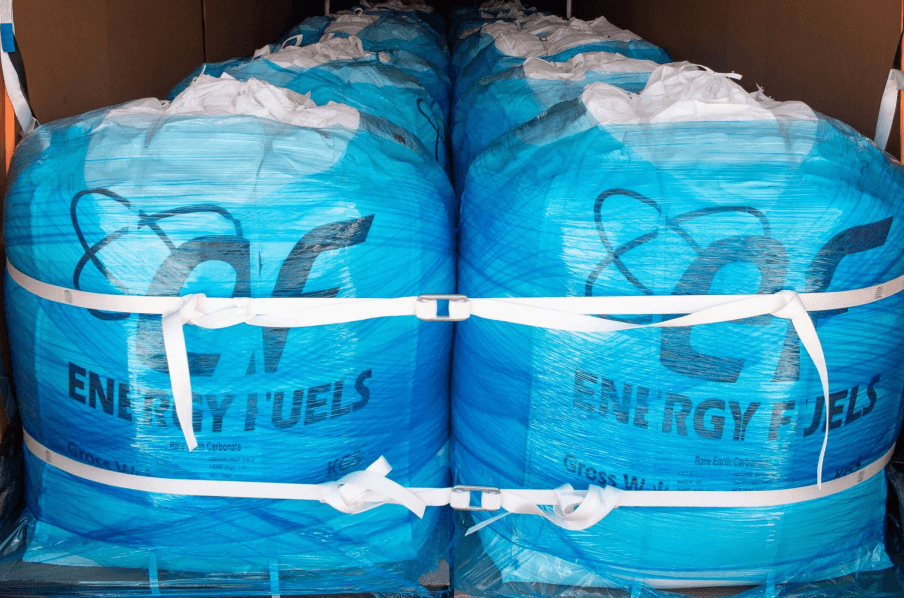Leveraging Its Assets, Energy Fuels Aims to Supply the Minerals Needed for the Energy Transition

Energy Fuels plans to grow into an integrated critical minerals producer leveraging its White Mesa Mill, producing uranium, rare earths, vanadium.
- Uranium market fundamentals are strong, with increasing demand and constrained supply expected to drive higher uranium prices.
- Energy Fuels is focused on producing uranium, rare earths, and vanadium from its White Mesa Mill in Utah. The company plans to ramp up uranium production to 1-2 million pounds per year in the near-term.
- For rare earths, Energy Fuels is building out processing capabilities at White Mesa in phases. Phase 1 is underway, with larger expansions planned for the future.
- The company has a strong balance sheet, with over $200 million in working capital and inventory. Energy Fuels has been profitable the last 2 years.
- CEO Mark Chalmers aims to grow Energy Fuels into a "multi-billion dollar company" producing critical minerals vital for the energy transition.
About Energy Fuels
Founded in 1987, Energy Fuels is a leading U.S.-based uranium mining company with a focus on environmentally friendly, conventional mining techniques. The company is a vertically integrated producer, controlling all aspects of its operations from mining to milling to processing. Energy Fuels’ flagship asset is the White Mesa Mill in Utah, which is the only fully-licensed and operating conventional uranium mill in the U.S. With licensed capacity to produce over 8 million pounds of U3O8 per year, the White Mesa Mill also has the potential to produce vanadium and rare earth products, providing Energy Fuels diverse exposure to critical minerals needed for the global transition to carbon-free energy sources.
With uranium fundamentals strengthening amid rising demand and constrained supply, Energy Fuels is in an enviable position with its licensed, low-cost production capabilities and extensive mineral resources in the U.S.
Uranium Outlook is Strong, Supporting Energy Fuels' Projects
With most forecasts predicting rising demand and deficits in the coming years, sentiment for nuclear power continues to improve globally. Several factors are contributing to nuclear power’s resurgence, including necessity of carbon-free base load power and political instability causing concerns over energy security.
With demand fundamentals positive, uranium prices are poised to continue trending higher after rising significantly in 2022 and early 2023. This outlook provides a supportive backdrop for Energy Fuels to restart uranium production at its conventional mines while also evaluating other projects in its extensive pipeline.
Phased Production Growth Plans at Energy Fuels’ Conventional Mines
In the near-term, Energy Fuels plans to resume uranium mining at its Pinyon Plain project in Arizona and its La Sal complex of mines in Utah. With initial production of 750,000 pounds of U3O8 per year expected from Pinyon Plain combined with about 250,000 pounds per year from La Sal, Energy Fuels targets ramping up to 1 million pounds of total uranium production in 2024. Importantly, the infrastructure at these conventional mines is already in place, allowing for a quick restart with minimal capital expenditures.
This 1 million pound production figure represents just the first phase of Energy Fuels’ planned ramp-up. With limited capital investment, the company can boost its production capacity to 2 million pounds per year in the short-term. Beyond that, the company has the ability to potentially produce between 3-5 million pounds annually with incremental capital investments of around $100 million for each 1 million pound expansion. With Elko County’s Nichols Ranch in-situ recovery (ISR) project also available as an operating option, Energy Fuels has a clear path to substantially grow its U.S. uranium production as market conditions further improve.
Integrating Rare Earth Production and Processing Capabilities
In addition to its core uranium business, Energy Fuels is building out rare earth element (REE) production and processing at the White Mesa Mill. The company is advancing a phase one separation circuit at the mill focused on producing a mixed REE carbonate, which will be in operation in early 2024. This phase one production has nameplate capacity approaching current global leader MP Materials’ output.
For future expansions, Energy Fuels plans to construct a standalone rare earth processing facility at the White Mesa Mill site. With phase two of this strategy, the company aims to increase separation capacity by 3-4 times current levels. Ultimately, Energy Fuels’ plans can support total rare earth processing approaching 75-80% of MP Materials’ nameplate capacity. With an experienced technical team and the benefits of operating in a low-cost region like Utah, Energy Fuels appears well-positioned to become a globally significant rare earths producer.
Strong Cash Position Provides Platform for Growth
Supporting its planned growth initiatives, Energy Fuels maintains a strong financial position with no debt. As of the latest quarter, the company reported $135 million in working capital and inventories. This figure understates the true cash position, as it excludes the value of conversion contracts, equity stakes in enCore Energy and other holdings. After adjusting for these assets, Energy Fuels’ working capital exceeds $200 million currently.
With cash flows from ongoing uranium sales and vanadium co-product production, Energy Fuels is funding initial rare earth capital projects from its existing treasury. Moreover, with bipartisan support for domestic critical mineral production gaining traction, Energy Fuels can tap into government programs and private capital sources to finance the company’s more sizable phase two rare earth expansion when needed. With a market capitalization of around $1.6 billion compared to the scale of its growth ambitions, Energy Fuels offers investors upside potential as it continues advancing up the value chain into integrated rare earth processing.
Conclusion: Leveraging Vertical Integration into Critical Minerals
With permitted infrastructure, operational experience and extensive mineral resources, Energy Fuels is an emerging vertically integrated critical mineral company. The White Mesa Mill lies at the heart of the company’s strategy, providing a centralized hub to process various ores containing uranium, rare earths, vanadium and other elements vital for carbon-free energy technologies.
CEO Mark Chalmers brings decades of expertise across global uranium, vanadium and rare earth production. With his proven track record and intimate knowledge of Energy Fuels’ assets, investors can feel confident in management’s capabilities to execute on the company’s ramp-up plans. With a vision to grow Energy Fuels into a multi-billion dollar company, the current $1.6 billion valuation leaves substantial upside potential as the company expands into a broader critical minerals platform beyond just uranium. For investors seeking leverage to the global transition to carbon-free energy, Energy Fuels provides unique exposure through its diversified portfolio of mining projects and integrated production infrastructure.
Analyst's Notes




Subscribe to Our Channel
Stay Informed












































